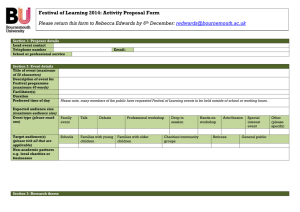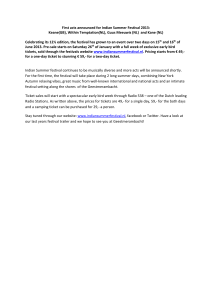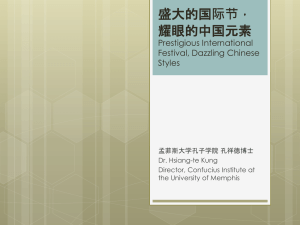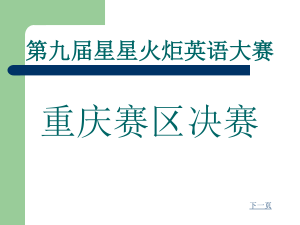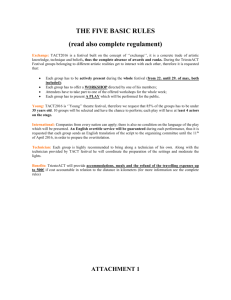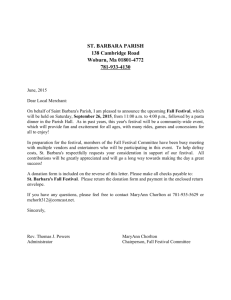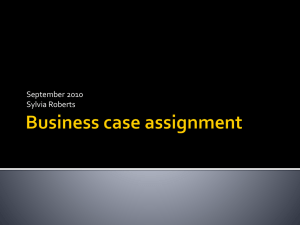Riga Vassiliki
advertisement
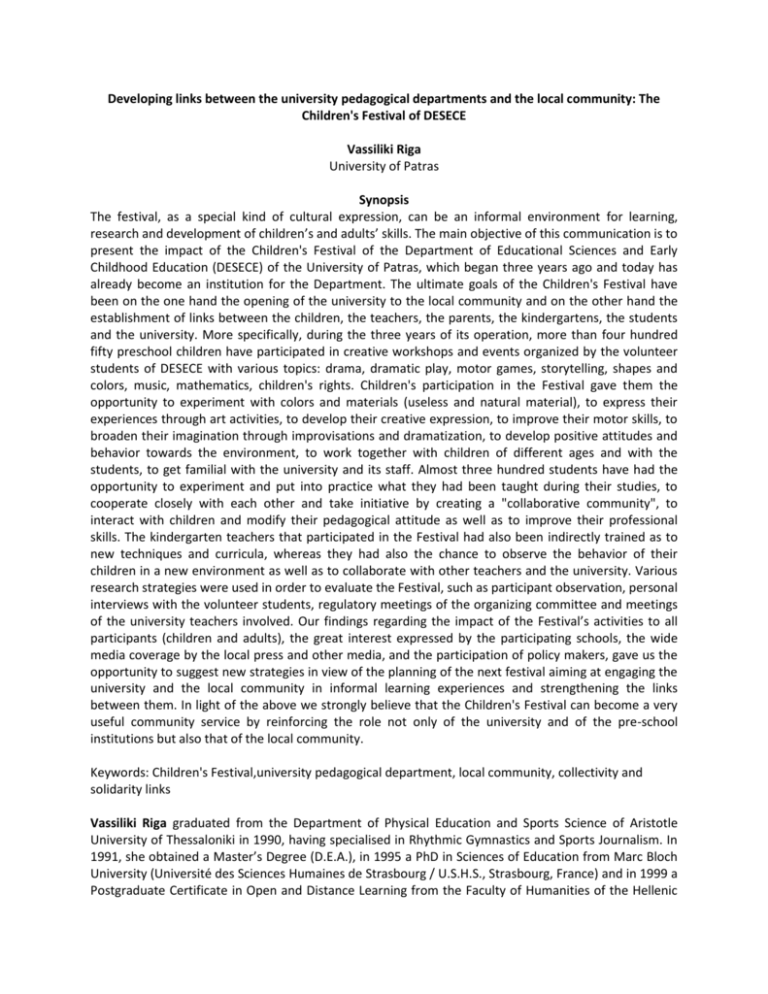
Developing links between the university pedagogical departments and the local community: The Children's Festival of DESECE Vassiliki Riga University of Patras Synopsis The festival, as a special kind of cultural expression, can be an informal environment for learning, research and development of children’s and adults’ skills. The main objective of this communication is to present the impact of the Children's Festival of the Department of Educational Sciences and Early Childhood Education (DESECE) of the University of Patras, which began three years ago and today has already become an institution for the Department. The ultimate goals of the Children's Festival have been on the one hand the opening of the university to the local community and on the other hand the establishment of links between the children, the teachers, the parents, the kindergartens, the students and the university. More specifically, during the three years of its operation, more than four hundred fifty preschool children have participated in creative workshops and events organized by the volunteer students of DESECE with various topics: drama, dramatic play, motor games, storytelling, shapes and colors, music, mathematics, children's rights. Children's participation in the Festival gave them the opportunity to experiment with colors and materials (useless and natural material), to express their experiences through art activities, to develop their creative expression, to improve their motor skills, to broaden their imagination through improvisations and dramatization, to develop positive attitudes and behavior towards the environment, to work together with children of different ages and with the students, to get familial with the university and its staff. Almost three hundred students have had the opportunity to experiment and put into practice what they had been taught during their studies, to cooperate closely with each other and take initiative by creating a "collaborative community", to interact with children and modify their pedagogical attitude as well as to improve their professional skills. The kindergarten teachers that participated in the Festival had also been indirectly trained as to new techniques and curricula, whereas they had also the chance to observe the behavior of their children in a new environment as well as to collaborate with other teachers and the university. Various research strategies were used in order to evaluate the Festival, such as participant observation, personal interviews with the volunteer students, regulatory meetings of the organizing committee and meetings of the university teachers involved. Our findings regarding the impact of the Festival’s activities to all participants (children and adults), the great interest expressed by the participating schools, the wide media coverage by the local press and other media, and the participation of policy makers, gave us the opportunity to suggest new strategies in view of the planning of the next festival aiming at engaging the university and the local community in informal learning experiences and strengthening the links between them. In light of the above we strongly believe that the Children's Festival can become a very useful community service by reinforcing the role not only of the university and of the pre-school institutions but also that of the local community. Keywords: Children's Festival,university pedagogical department, local community, collectivity and solidarity links Vassiliki Riga graduated from the Department of Physical Education and Sports Science of Aristotle University of Thessaloniki in 1990, having specialised in Rhythmic Gymnastics and Sports Journalism. In 1991, she obtained a Master’s Degree (D.E.A.), in 1995 a PhD in Sciences of Education from Marc Bloch University (Université des Sciences Humaines de Strasbourg / U.S.H.S., Strasbourg, France) and in 1999 a Postgraduate Certificate in Open and Distance Learning from the Faculty of Humanities of the Hellenic Open University. From 1997 onwards she has been teaching at the pedagogical departments of the universities of Athens and Thessaly, at the Hellenic Open University, as well as at the Technological Educational Institute of Athens. Since 2009, she works as a Lecturer at the Department of Educational Sciences and Early Childhood Education of the University of Patras specializing in “Theatrical Expression, Rhythm and Movement in Preschool Education". She was a Member of the Board of EADAP, and of the International Standards Advisory Board of ISSA (International Step by Step Association), she is member of OMEP (OrganisationMondiale pour L'ÉducationPréscolaire), of SPA Hellas (Scientific Psychomotor Association Hellas), of the Hellenic Theatre/Drama and Education Network and of the Hellenic Adult Education Association. She is also an evaluator of Adults’ Trainers for the National Accreditation Centre of Continuing Vocational Training (EKEPIS).

